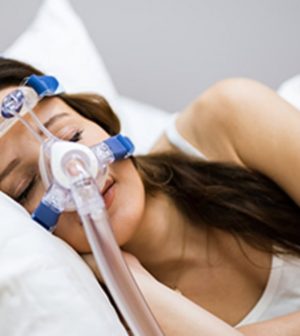- Could Your Grocery Store Meat Be Causing Recurring UTIs?
- Are You Making This Expensive Thermostat Error This Winter?
- Recognizing the Signs of Hypothyroidism
- 10 Strategies to Overcome Insomnia
- Could Artificial Sweeteners Be Aging the Brain Faster?
- Techniques for Soothing Your Nervous System
- Does the Water in Your House Smell Funny? Here’s Why
- Can a Daily Dose of Apple Cider Vinegar Actually Aid Weight Loss?
- 6 Health Beverages That Can Actually Spike Your Blood Sugar
- Treatment Options for Social Anxiety Disorder
New Insights Into How Sleep Apnea Affects the Brain

Millions of Americans deal with the sleep deficits brought on by sleep apnea, and many turn to one of the few treatments out there, continuous positive airway pressure (CPAP) machines.
But what if new neurochemical targets in the brain could lead to new, less cumbersome therapies for sleep apnea?
That’s what a team at the University of Missouri-Columbia are working on in their lab. They’ve pinpointed specific brain chemicals in mouse brains that link sleep apnea to one of its most unhealthy side effects, high blood pressure.
“Our ultimate goal is to eventually help clinicians develop specific drugs to target either these neurochemicals or the proteins they bind to in a way that reduces high blood pressure,” explained senior study author David Kline, an investigator at the university’s Dalton Cardiovascular Research Center.
The study, which was led by postdoctoral researcher Procopio Gama de Barcellos Filho, involved mice whose brains were subjected to a low-oxygen state similar to what humans experience when they periodically stop breathing due to sleep apnea.
Examining the rodents’ neurochemistry, Filho and Kline noticed key changes when in this “hypoxic” state.
“When oxygen levels in the blood drop during sleep apnea, the forebrain sends warning signals to the brainstem area that controls heart and lung functions,” Kline explained. “By studying these signals, we found that two neurochemicals, oxytocin and corticotropin-releasing hormone (CRH), cause the brainstem to become overactive.”
Over the long term, this brainstem overactivity can trigger high blood pressure, he said, with all its attendant health issues, such as stroke.
“Not only do those with sleep apnea often have high blood pressure, but they also lose a lot of sleep, they have more cognitive and memory issues, and they are more prone to injury at work due to sleepiness,” Kline added in a university news release.
The findings were published recently in The Journal of Physiology.
Could these new insights lead to drugs or other treatments that might short-circuit some of sleep apnea’s worst effects on health? The research is early, and experts note that findings in animal studies doesn’t always pan out in people.
Still, Kline is hopeful.
“This discovery opens the door for future research to block the pathways these neurochemicals use, ultimately helping to bring blood pressure back to normal levels,” said Kline, who is also a professor in the university’s College of Veterinary Medicine.
More information
Find out more about sleep apnea at the National Heart, Lung and Blood Institute.
SOURCE: University of Missouri-Columbia, news release, July 23, 2024
Source: HealthDay
Copyright © 2026 HealthDay. All rights reserved.










